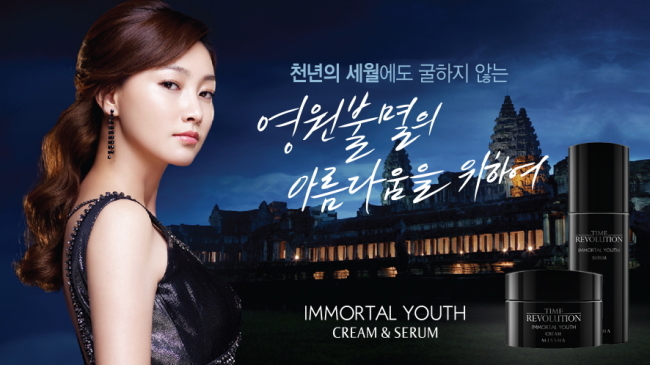화장품 브랜드숍 업계 1위 미샤를 운영하는 에이블씨앤씨의 서영필 회장은 중국을 비롯한 해외 시장에서 큰 기대를 하고 있지 않다고 27일 기자간담회에서 밝혔다.
서 회장은 "중국에 (미샤 제품을 판매하는) 매장 수는 많은데, 한국처럼 미샤 단독매장이 아니고 일부 품목만 입점된 매장 수를 포함한 것이다. 한국보다 훨씬 열악한 조건에서 일하다 보니 저는 해외 비즈니스를 긍정적으로 보지 않는다"며 해외 사업의 고충을 토로했다.
그는 "중국은 하루가 다르게 법률이 바뀌고 진출한 해외 업체들의 위험도 많아서 매우 힘들다고 생각한다. 해외에서 쉽게 성과 내겠다는 생각은 하지 않으며, 성과보다는 안정적으로 영업이익 창출해서 생존하는 것이 일차적인 목표"라고 말했다.
또 중국과 일본은 수많은 전세계 화장품 브랜드가 들어와 있어서 미샤가 매출을 늘리기 쉽지 않으며, 따라서 미샤의 매출에서 해외 비중이 작을 수 없다고 밝혔다.
에이블씨앤씨는 작년 매출이 사상 최대인 4천522억9천만원으로 37% 증가했다고 27일 공시했다. 이 중 해외 매출은 10.7% 정도이다.
연결재무제표 기준으로 영업이익은 542억1천만원으로 전년보다 61.5%, 당기순이익은 425억5천만원으로 50.5% 늘었다.
서 회장은 또 “현재 국내 전체 화장품업계 3위인 미샤가 2위 LG생활건강을 넘어서지 않으면 회사의 미래는 없다”며 2017년에 매출 1조원을 달성하고 이어 업계 2위에 올라서겠다고 밝혔다.
LG생활건강이 인수한 더페이스샵 브랜드는 2011년부터 브랜드숍 업계 1위를 미샤에 내줬다. 그러나 LG생활건강은 이미 지난해 화장품 부문의 매출이 1조3천억원에 이르고, 2017년 목표는 2조5천억원으로 에이블씨앤씨에 한참 앞서 있다.
‘화장품 업계 2강’ 목표의 실현 가능성과 관련, 서 회장은 “반드시 매출만으로 2강을 정의할 수 있는 것은 아니다”며 “제품력과 고객관계 등에서 소비자에게 2강으로 인식되는 것도 중요하다”고 설명했다.
그는 또 “고가화장품이 30%가 넘는 한국 시장은 아직도 왜곡된 상태”라며 “최근의 브랜드숍 화장품 인기는 시장이 정상화 하는 과정”이라고 진단했다.
서 회장은 미샤가 불러온 할인 경쟁이 브랜드숍 화장품 시장에 대한 소비자의 신뢰도를 떨어뜨리는 등의 부정적인 효과를 초래했다는 점을 인정하면서도 “마케팅의 대세가 됐기 때문에 되돌릴 수 없다”고 말했다.
(코리아헤럴드 김소현 기자)
<관련 영문 기사>
Missha keeps top spot among cosmetic brand shops with record sales
By Kim So-hyun
Able C&C, which owns low-priced cosmetic brand Missha, said Wednesday its sales last year hit a record 452.3 billion won ($416.3 million), keeping its No. 1 spot among cosmetic brand shops.
The company said its sales and net profit jumped 61 percent and 51 percent, respectively, from 2011, on booming sales of its high-end skin care products.
Missha’s “The First Treatment Essence” sold over 1.5 million bottles within just 15 months of its launch, and “New Science Activator Ample” sold 1 million bottles in 12 months.
This year, Able C&C plans to open about 100 more Missha shops in Korea in addition to the current 613, with a sales target of 546.1 billion won, over 92 percent of which is expected to be domestic. It aims to reach 1 trillion won in sales by 2017.
Overseas, Missha is sold in 1,121 shops including Watson’s drugstores and Missha brand shops across 31 countries including China, Japan, the U.S., Romania, Saudi Arabia and Russia. Nearly half of the stores are in China, and 44 percent in other parts of Asia. However, only about 100 of the stores in China are Missha’s own brand shops and the rest are cosmetic stores that sell some of its products.
Able C&C chairman Seo Young-pil was cautious about his ambitions in the overseas markets.
“I am not optimistic about our overseas business since we are faced with much tougher conditions. Doing business in China is hard because their rules change every day and there are too many risks for foreign firms,” Seo said in a press conference Wednesday.
“Also, China and Japan have cosmetic brands from all around the world. Our goal abroad is not to make great progress, but to survive by generating a stable operating profit.”
Seo attributes Missha’s success last year to aggressive marketing through comparisons with foreign cosmetic products, generous regular sales and two-way communication with customers through its Beautynet website.
Missha holds a 20 percent discount sale called “Missha Day” every month, and sales of up to 50 percent off every year in July and December.
Despite its huge sales increase, Able C&C’s operating profit lingers at around 10 percent of sales due to the chairman’s policy to not rake in more than that.
When the company earns much more than 10 percent of sales, it gives out bonuses of up to 50 percent of annual salaries to its 260 employees and invests more in marketing.
This year, Able C&C expects the domestic cosmetics market to grow by about 4 percent to 10.1 trillion won as more conglomerates enter the drugstore business, sales of expensive brands sold in department stores weaken and growth of demand for men’s cosmetics continues.
Established in 2000 initially as an online brand, Missha opened its first brand shop two years later near Ewha Womans University. Its sales broke the 100 billion won mark in 2004, and slightly faltered until 2007.
But with diverse sales strategies, expansion of its retail network through subway stations at home, star products such as BB cream and mascara, Able C&C’s sales grew nearly sixfold from 78.5 billion won in 2007. It launched two other brands -- A’pieu targeting consumers in their late teens and early 20s in 2011 and online manicure brand Mika this year.
The company’s stock price jumped from 3,200 won in 2009 to over 70,000 won per share at present.
“The price-to-earnings ratio of Able C&C is about 14, less than that of most other cosmetics firms which hover around 20. We believe our stock price can go higher,” said Lee Kwang-yeol, vice president of Able C&C.
(
sophie@heraldcorp.com)








![[Today’s K-pop] Blackpink’s Jennie, Lisa invited to Coachella as solo acts](http://res.heraldm.com/phpwas/restmb_idxmake.php?idx=644&simg=/content/image/2024/11/21/20241121050099_0.jpg)